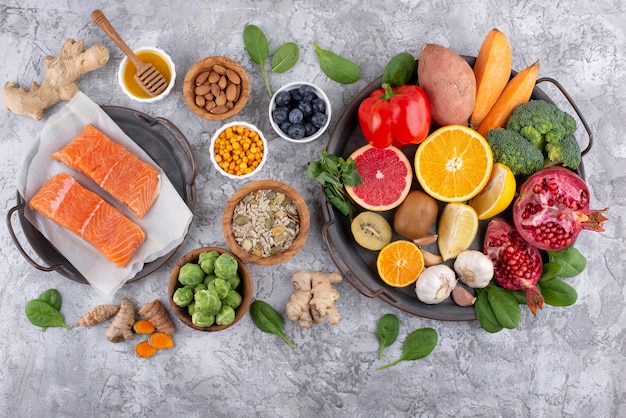A balanced diet is important for sustainable weight loss. Unlike crash diets that promise quick results but often lead to weight gain later, a balanced diet supports the body with all the nutrients it needs. It helps in losing weight steadily without feeling weak or hungry.
Research shows that successful fat loss happens when people develop healthy eating habits instead of following short-term diet plans. A healthy diet includes all the necessary nutrients, such as proteins, carbohydrates, fats, vitamins, minerals, and fiber. These nutrients help the body stay energized, digest food properly, and control hunger.
When followed properly, a nutritious diet increases the chances of losing weight and keeping it off. To understand how it works, let’s look at its key parts and how they help with healthy weight loss.
Understanding a Balanced Diet
A balanced diet gives the body the right nutrients to stay strong and healthy. It is different from strict diets that cut out food groups. Instead, it allows for variety while keeping metabolism, muscles, and overall health in good shape. Eating a mix of the right foods helps the body get energy and nutrients without causing weight gain.
A well-nutritious diet includes the following main food groups:
-
Fruits and Vegetables
Fruits and vegetables are full of vitamins, minerals, and fiber. They help with digestion and keep you full for longer. They also provide antioxidants, which help the body fight diseases. Some good choices include leafy greens (spinach, kale), berries (blueberries, strawberries), citrus fruits (oranges, lemons), and vegetables like broccoli and cauliflower.
-
Whole Grains
Whole grains have more fiber than processed grains. They help to keep blood sugar stable and prevent hunger spikes. Unlike white bread or sugary cereals, whole grains provide steady energy. Some healthy options include quinoa, brown rice, oats, and whole wheat bread.
-
Lean Proteins
Protein helps maintain muscles, speed up metabolism, and reduce hunger. Eating enough protein prevents muscle loss and keeps you full. Good sources include chicken, turkey, fish (salmon, tuna), eggs, beans, lentils, and tofu.
-
Healthy Fats
Healthy fats are good for the brain, hormones, and overall health. They also help the body absorb vitamins. The best sources include avocados, nuts (almonds, walnuts), seeds (chia, flaxseeds), olive oil, and fatty fish (salmon, mackerel).
-
Dairy or Dairy Alternatives
Dairy products give calcium, protein, and probiotics, which help with digestion and bone health. Greek yogurt, milk, and cheese are good options. If you can’t eat dairy, almond milk, soy milk, and coconut yogurt are good alternatives.
The Role of a Balanced Diet in Weight Loss

A balanced diet helps with weight loss by controlling calorie intake, keeping you full longer, and supporting metabolism. They provide the right nutrients to help you lose weight in a healthy and lasting way. Knowing how different foods affect sustainable weight can help you make better eating choices for long-term success.
1. Caloric Control Without Starvation
A nutritious diet helps control calorie intake without constant hunger. Weight loss occurs when you use more calories than you eat. Eating nutrient-rich foods makes this process easier.
Instead of eliminating entire food groups, a healthy diet focuses on whole, satisfying foods that prevent cravings. Choosing vegetables, lean proteins, and whole grains naturally reduces processed snacks and sugary drinks, helping with fat loss sustainably and healthily.
2. Increased Satiety and Reduced Cravings
Eating a nutritious diet increases satiety and reduces the urge to snack frequently. Foods rich in fiber, protein, and healthy fats slow digestion and keep blood sugar levels stable, preventing sudden hunger spikes.
Research shows that protein increases fullness hormones while lowering the hormone that triggers hunger. Adding eggs, nuts, fish, and whole grains to your meals can help control cravings and prevent overeating.
3. Metabolic Support and Muscle Maintenance
A stable diet helps your metabolism work efficiently and keeps your muscles strong while losing weight. Muscles burn more calories than fat, so maintaining muscle is important for healthy weight management.
Eating enough protein prevents muscle loss, so your body burns fat instead of muscle. Nutrients like iron and B vitamins help produce energy. This keeps your metabolism active and helps your body burn calories efficiently throughout the day.
4. Blood Sugar Regulation and Hormonal Balance
Keeping blood sugar levels stable is essential for controlling hunger and reducing cravings. A healthy diet with whole grains, proteins, and healthy fats prevents energy crashes that lead to overeating.
Balanced meals help regulate insulin and other hormones that affect metabolism and appetite. When blood sugar stays steady, energy levels remain consistent. This makes it easier to follow healthy eating habits and lose weight in a sustainable way.
Practical Strategies for Implementing a Balanced Diet
Consider these practical strategies to have a balanced and nutritious diet:
- Prioritize Whole Foods: Choose whole foods to help your body stay healthy and support fat loss.
- Monitor Portion Sizes: Eating the right portions ensures you don’t consume more calories than needed.
- Maintain Regular Meal Patterns: Eating meals at consistent times helps your body regulate hunger and metabolism.
- Stay Hydrated: Drinking enough water helps digestion and stops you from confusing thirst with hunger.
- Limit Ultra-Processed Foods: Cut back on fast food, sugary drinks, and processed snacks. They can slow down weight loss and negatively affect your health.
Frequently Asked Questions (FAQs)
What is a sustainable weight loss speed?
Losing 1 to 2 pounds per week is a sustainable weight loss speed. This rate allows the body to burn fat while maintaining muscle mass.
What is the 30/30/30 rule for weight loss?
The 30/30/30 rule involves eating 30 grams of protein within 30 minutes of waking up and then doing 30 minutes of light exercise.
What is the importance of a nutrient-rich diet?
A nutrient-rich diet is important because it provides essential nutrients that support overall health and weight management. It ensures the body gets vitamins, minerals, proteins, carbohydrates, and healthy fats.
Final Words
A balanced diet is the best long-term approach for sustainable weight loss. Eating nutrient-rich foods and controlling portions helps maintain a healthy weight. Research confirms that fad diets fail in the long run, while balanced eating supports lasting results.
Small, consistent changes in food choices, meal habits, and portion sizes improve health and make weight reduction maintainable. Following a nutritious diet based on individual needs leads to lasting success.






